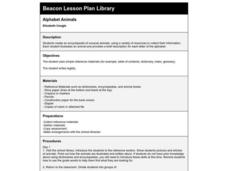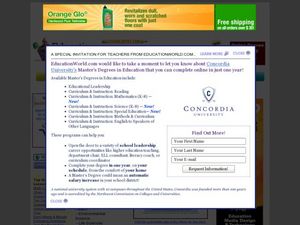Curated OER
Guided Reading Organizer for Chain Reaction
The class uses Chain Reaction, a magazine, to build a better understanding of Latin and Greek roots found in scientific vocabulary. They use two attached worksheets to help them read a scientific article, using visual clues and their...
Curated OER
Making a Karst Dictionary
Students practice using the correct vocabulary in geology and hydrology. They use the Internet to research topics and practice their researching skills.
Curated OER
Colossal Squid Caught in Antarctic
Students define the word colossal, then read a news article about an enormous squid caught off Antarctica. In this animal studies and current events instructional activity, the teacher introduces the article with dictionary and...
Curated OER
Exploring Arizona's Biotic Communities Lesson 2: Biotic Communities Vocabulary
Part of a unit on Arizona's biotic communities, this instructional activity focuses on the vocabulary to be used. Terms include biodiversity, topography, desert, hybridization, niche, and more! Youngsters will define these words from...
Curated OER
Plants: Report Planner
Introduce your young learners to the basic research project. They explore plants using a three-page note-taking guide. On the first page, they write down things they would like to know about the topic and where they might look to find...
Curated OER
Red Leaf, Yellow Leaf
Young scholars discuss the differences between a storybook and an information book. Students use various materials found in nature to make a nature collage. Young scholars make a nature dictionary using pictures and their own definitions...
Curated OER
Dichotomous Keys
Students define the word dichotomous and explain why a dichotomous key is a useful tool in identifying different species. Then they look up words they are unfamiliar with or mollusk reference books so students can
learn the names of...
Curated OER
Give a Hoot About Owls
Students research basic information about owls. They complete a class KWL chart, and conduct research on owls using the Internet and a variety of resource books. Next, they write an owl acrostic poem and a report using their research...
Curated OER
Wolf Fact Cards
Students write a non-chronological report about wolves. They read and discuss wolf fact cards in small groups, complete a KWL chart, observe the teacher model the steps of writing a report, and conduct research and write an original...
Curated OER
How the Environment Affects Our Health
Ninth graders explore how the environment affects health. In this infectious disease lesson, 9th graders investigate what environmental situations cause infections diseases. Students study the symptoms, treatments, prevention, and...
Curated OER
Volcanoes: Report planner
In these volcano worksheets, 3rd graders will be guided through the process of completing a report on volcanoes. With three questions, writing prompts, and a KWL chart, students will write a final report on what they have learned.
Curated OER
Alphabet Animals
Second graders create an encyclopedia of unusual animals, using a variety of resources to collect their information. Each student illustrates an animal and provides a brief description for each letter of the alphabet. A very nice,...
Curated OER
Shadow Trackers
Students use online websites to inquire about the cycle of day and night. In this web based lesson, students are able to see the movement of the sun and Earth. Students can look at different parts of the Earth as if they were on the Sun...
Curated OER
Watch the Birdie
Students complete a six-week unit on North American birds. They conduct research, develop fact sheets, create labeled bird drawings, write a dictionary of bird vocabulary words, create a Concentration game, and observe birds in their...
Curated OER
Centipede or Millipede?
Students discuss millipedes and centipedes in terms of their classification as arthropod. Using a diagram, students categorize and compare and contrast the characteristics of millipedes and centipedes based on their discussion of...
Curated OER
Finding the Pole Star
Students study the constellations fo the Big Dipper and Cassiopeia and their use in finding the Pole Star. They realize that other celestial objects--Sun, Moon and planets--share the rotation (and hence rise and set), even though their...
Curated OER
In the Scheme of Things
Fifth graders examine the food webs of different animals. They discuss the characteristics of those animals as well. They work together to develop their own definition for the word niche.
Missouri Department of Elementary
Equine Science
Did you know that horses have two sets of teeth? There is much to learn about horses, of course, and those interested in equine science will learn much from a 10-lesson agricultural science course that covers not only equine dental...
Curated OER
Ducks
Students explore and learn about the habitats, diets, and specific attributes of various species of ducks. Students know the names of at least seven species of ducks and at least five criteria for identifying species of ducks.
Curated OER
Rising Temperatures Threaten Penguins
Young scholars examine the continent of Antarctica, then read a news article about the decline in the Antarctic penguin population. In this current events lesson, the teacher introduces the article with a discussion and vocabulary...
Curated OER
Bird Up
Third graders identify basic physical and behavioral characteristics of birds and how they adapt to their environments. To organize and share scientific information with peers. They discuss similarities and differences among birds....
Curated OER
Coming to Terms
Students explore the rainforest. In this environmental lesson, students work in small groups to conduct online research of various topics having to do with the rainforest. The groups construct a large poster to illustrate the concepts...
Curated OER
Looking for Newton
Students discuss the rhyming pattern of various types of poetry. With a focus on limericks, they follow the specific rhyme scheme and create a limerick about Newton. They share their poem with the class and write another one related to...























